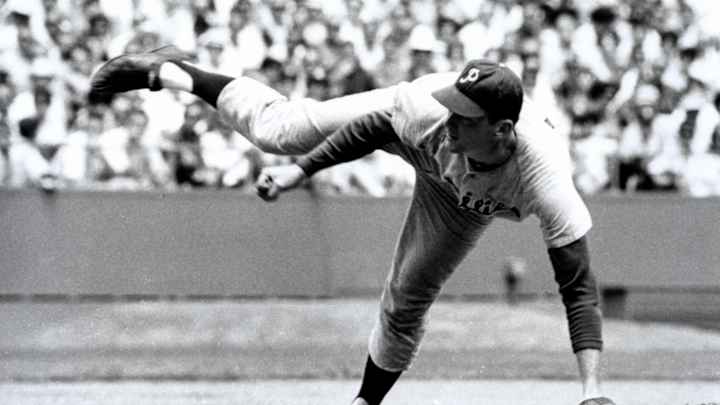Phillies Legends: Jim Bunning

A tall and lanky boy from Kentucky, Jim Bunning attended Xavier University on a baseball scholarship and was scouted his freshman year by the Detroit Tigers. He agreed to sign with the franchise as long as he could skip Spring Training for a few years to graduate from Xavier with a degree.
He spent six seasons in the minors with a few short stints in Detroit. It was frustrating, but Bunning persevered and continued to sharpen his craft on the mound. He finally became an everyday face for the Tigers in 1957 when he won 20 games, earned his first All-Star selection, and came in 9th place in AL MVP voting.
In the ‘57 All-Star game, Bunning was the starting pitcher for the American League and even retired all nine batters that he faced.
Bunning pitched six more seasons in Detroit and was one of the most dominant pitchers in the Majors. Eventually, the Tigers lost interest in their pitcher who refused to change his pitching motion, was an outspoken player on the team, and worked as a stockbroker in the offseason.
Prior to the 1964 season, Bunning was traded to the Philadelphia Phillies at the age of 32. He got off to a great start that season and pitched the greatest game of his career on June 21st (Father’s Day) when he pitched the fifth perfect game in the modern era of Major League Baseball (since 1900).
There have been a total of 21 modern era perfect games pitched, making it one of the most impressive feats in sports.
With that, let’s take a look at Bunnings greatest career achievements:
- National Baseball Hall of Fame (As a Detroit Tiger)
- Philadelphia Phillies Wall of Fame
- 9x All-Star
- Two career no-hitters (One being the perfect game)
- 224 wins - 71st all time
- 2,855 strikeouts - 20th all time
- 40 shutouts - 44th all time
The Phillies infamous collapse in September of 1964 would lead them to narrowly miss the NL Pennant by one game. Bunning won 19 games that season for the Phils and went on to win 19 games in the ‘65 and ‘66 seasons as well.
In 1967, Bunning led the Majors in strikeouts with 253, won 17 games, and finished in second place for the CY Young Award. That would end his first stint with the Phillies as Bunning was traded to Pittsburgh in the offseason.
He spent a couple seasons in Pittsburgh and finished the ‘69 season with the Dodgers before returning to Philadelphia for the ‘70 and ‘71 seasons that would end his career.
In his six seasons with the Phillies, Bunning pitched 1,520.2 innings gathering 1,197 strikeouts, posting a 2.93 ERA, and maintaining a 1.111 WHIP.
While Bunning is in the Hall of Fame as a Detroit Tiger, he still made an immense contribution to Philadelphia. He built an incredible reputation as one of the greatest pitchers of the 50s and 60s and therefore earned his plaque on the Philadelphia Phillies Wall of Fame.
More From SI's Inside The Phillies:

Tom Skulski is an author for FanNation's "Inside the Phillies", part of Sports Illustrated. Tom is a Senior at Temple University in Philadelphia, PA. Follow him on Twitter @skulski_t